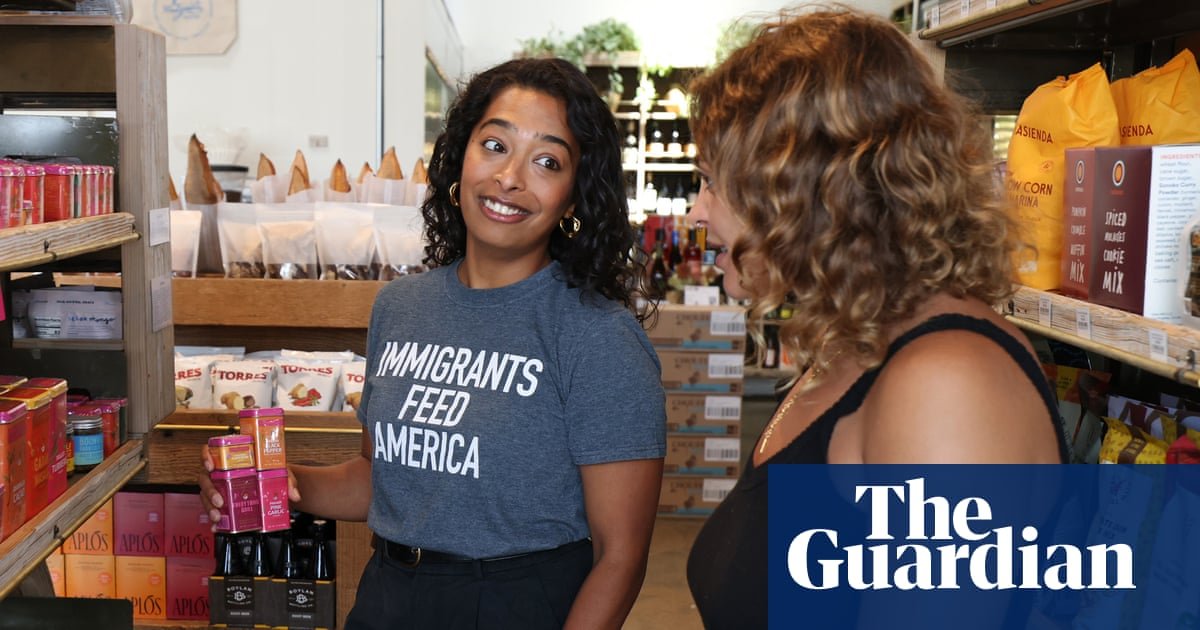Business
At 23, she set out to modernize the spice trade. Now she’s navigating Trump’s tariffs | Business

In 2016, turmeric lattes were all the rage, but Sana Javeri Kadri thought the ones in San Francisco, where she lives, tasted nothing like the fresh spices she grew up with in India.
A former line cook who was doing marketing for a Bay Area grocer, Javeri Kadri “knew [her] way around spices”, but was new to the industry. Still, she booked a ticket home to Mumbai, hoping that she could get richer flavors into US pantries.
After reaching out to a number of growers, she met an organic turmeric farmer and, using her tax refund and a loan from her parents, bought a batch of the crop. It became the foundation of Diaspora Co, which Javeri Kadri launched the following year at just 23.
From the outset, Javeri Kadri aimed to bypass industrial spice farms, whose products she found bland, and instead source from farmers using regenerative practices. This meant working directly with the producers and paying them a living wage.
“By rough math, I probably reached out to around 2,500 farmers,” she said.
After two years of growing a US market for her turmeric, Javeri Kadri added black pepper to the mix. For a while after that, it was an “exponential growth curve”, she said.
Today Diaspora Co has 24 employees and sells around 40 different spices and blends, sourced from 140 different farms in India and Sri Lanka.
Diaspora Co is part of a wave of new spice companies, including Burlap & Barrel and Spicewalla, that center sourcing from sustainable farms, paying producers a living wage, building a more transparent (and streamlined) supply chain – steps they say allow them to put noticeably fresher spices on the market.
Javeri Kadri said it was common knowledge in the industry that because of the long supply chains, it can take years for spices to reach consumers, meaning they are “expired before they even get to you”.
She said Diaspora Co farmers rotate their crops, maintain plant diversity and use water-retention systems – regenerative practices that not only minimize the farms’ carbon footprint, but also make them more resilient to climate shocks.
That meant when extreme flooding struck Tamil Nadu, India, last year, Diaspora’s cardamom farm “had such great aerated soil and such good irrigation, they were only in standing water for a few hours before the soil and the property was able to flush itself clean”, minimizing losses, she said.
Javeri Kadri stressed that her partners were already practicing sustainable agriculture before she arrived on the scene, but she connects them with each other. “If you get them talking, they problem-solve themselves,” she said. “They’re all experts.”
Diaspora Co enjoys low worker turnover and lasting partnerships, something Javeri Kadri attributes to the company’s commitment to fair wages. “Once we build a relationship with them, it never goes anywhere,” she said.
In 2022, Diaspora Co launched a fund for farm workers, offering financial literacy workshops and providing seed money to open bank accounts, among other things. At a cardamom farm, workers asked for a community room and kitchen, which Javeri Kadri admitted wasn’t what she expected. But “it’s what they need, not what we think sitting in America that they need,” she said. “Really the point of it is that we listen to the workers directly.”
Franco Fubini, a Diaspora Co board member and founder and CEO of sustainable food sourcing platform Natoora, said Javeri Kadri wasn’t just “trading spices”, she was building a unique supply chain and helping to catalyze demand for products that “are created in harmony with nature”.
He added: “Whenever you have a company that is creating a market by stimulating demand, buying the right product, paying the right price for it, and creating a healthy farming ecosystem – that is what revolutionizing the food system is all about.”
Diaspora’s efforts to, as Javeri Kadri puts it, “decolonize the spice trade” have also proven profitable. She’s raised about $2.5m from angel investors in the last few years, and though she declined to share revenue numbers, she said the company had grown twentyfold over the past five years. Its spices are now sold in 400 US stores, and last year, with help from Natoora, Diaspora Co expanded into the UK.
Rather than pressuring existing partners to produce more and more, which could tax the land (and workers), Javeri Kadri said she plans to keep adding new farm partners in order to continue to boost production.
Javeri Kadri has other projects on the horizon, including a new Masala Chai tea blend, another blend developed with the former Top Chef host Padma Lakshmi, and a cookbook featuring recipes from partner farms. “A lot of people tell me, ‘Oh, Indian food is intimidating or heavy or complicated,’ and the whole premise of the book is, how do we make it as bright and fresh and accessible as possible?” Javeri Kadri said.
She plans to roll out these projects while managing an altogether new challenge: This month, Donald Trump said he would raise tariffs on Indian products to 50%, a move that Javeri Kadri predicts will cost her company between $100,000 and $200,000 by the end of the year, leaving her no choice but to eventually raise prices. (She said they had already paid about $20,000 in tariffs since April, when the US imposed its initial levies.)
Javeri Kadri’s entire business model is built on sourcing spices from the areas they are indigenous to in south Asia, which means she couldn’t pivot her supply chain even if she wanted to.
“People will say, ‘Well, we don’t need those exotic ingredients anyway,’” she said. But, she added, “there’s nothing as American as apple pie. And apple pie relies on cinnamon. An American classic is vanilla ice cream; we don’t grow vanilla. A lot of these ingredients are inherently not exotic, but they come from elsewhere.”
Tariffs could have an especially devastating effect on mission-driven companies like Diaspora, which operate on small margins even as they prioritize single-source farms and fair labor, said David Ortega, the Noel W Stuckman chair in food economics and policy at Michigan State University. “These tariff price increases can really jeopardize those priorities.”
With the higher tariffs – and the economic uncertainty surrounding trade policy – Javeri Kadri acknowledges that it may be hard to grow in the US market over the coming years. Her approach?
“We grow elsewhere. We go where we’re not penalized for doing business,” she said. “It’s very simple.”
Business
UK agrees £10bn deal to supply Norway with warships

The UK and Norway have agreed a £10bn deal under which Britain will supply the Norwegian navy with at least five new warships.
The agreement involving Type 26 frigates will be the UK’s “biggest ever warship export deal by value”, the Ministry of Defence (MoD) said, while Norway said it would be its largest “defence capability investment” to date.
The government said the deal would support 4,000 UK jobs “well into the 2030s”, including more than 2,000 at BAE Systems’ Glasgow shipyards where the frigates will be built.
UK Prime Minister Sir Keir Starmer said the agreement would “drive growth and protect national security for working people”.
“This success is testament to the thousands of people across the country who are not just delivering this next generation capabilities for our Armed Forces but also national security for the UK, our Norwegian partners and Nato for years to come,” he added.
The deal is also expected to support more than 400 British businesses, including 103 in Scotland, the MoD said.
The agreement represents a victory for the British government and defence industry over France, Germany and the United States – which were also being considered by Norway as possible vendors.
It will create a combined UK-Norwegian fleet of 13 anti-submarine frigates – eight British and five Norwegian vessels – to operate jointly in northern Europe, significantly strengthening Nato’s northern flank.
The warships will be constructed at the BAE systems yard in the Govan area of Glasgow, where frigates for the Royal Navy are currently being built.
Scottish Secretary Ian Murray said the choice of the UK “demonstrates the tremendous success of our shipbuilding industry and showcases the world-class skills and expertise of our workforce on the Clyde”.
Norway’s Prime Minister Jonas Gahr Støre, who informed Sir Keir of the decision to select the UK in a phone call on Saturday night, said the partnership “represents a historic strengthening of the defence cooperation between our two countries”.
Støre said the government had weighed two questions in its decision: “Who is our most strategic partner? And who has delivered the best frigates?… The answer to both is the United Kingdom.”
The Type 26 frigates purchased by the Royal Norwegian Navy will be as similar as possible to those used by their British counterparts, and have the same technical specifications.
They are specifically designed to detect and track enemy submarines and engage them in combat if necessary, with deliveries are expected to begin in 2030.
UK Defence Secretary John Healey said: “For over 75 years, Britain and Norway have stood together on Nato’s northern and north-eastern frontiers, keeping the UK and Europe safe. This historic defence deal deepens our strategic partnership.
“With Norway, we will train, operate, deter, and – if necessary – fight together.
“Our navies will work as one, leading the way in Nato, with this deal putting more world-class warships in the North Atlantic to hunt Russian submarines, protect our critical infrastructure, and keep both our nations secure.”
Business
First the great migration, now the big hold: why workers are staying put | US small business

The tide has turned. The great migration – when the shift to remote work prompted people to quit their jobs in droves – is officially over. Now comes the big hold.
According to a new survey from consulting firm Robert Half, 73% of respondents – workers at companies – said they plan to stay in their current roles through 2025. They gave reasons like having “positive company culture” and “feeling professionally fulfilled” or “being well compensated” at their current job. But there’s also a fourth reason why so many are staying put: the job market isn’t great and people are worried.
Job growth is significantly down. Job openings fell again to under 7.5m last month, a level that’s 4m below the openings available back in 2022. Wage gains during that same period had fallen from 6.7% to 4.1%.
Microsoft, AT&T, JP Morgan, Amazon and other companies are mandating their employees to return to their offices or lose their jobs. AI is already replacing workers at tech companies, Wall Street firms and retailers and some fear greater job losses in the not too distant future. Other cost cutting measures are leading big brands like Citi, Accenture, Tesla and Intel and other corporate giants to lay off tens of thousands of workers.
And what a great opportunity for small businesses!
For example, there’s my friend in Illinois. He has over 100 employees in his office. For years, he’s been spending half his days just walking around and talking to them. Telling them how important they are. Checking in on their lives and families. Asking them what they’re doing and what problems they’re having. Imagine working for that guy. Someone who genuinely cares about his workers. His turnover’s low. His retention is high.
Or another client of mine in Pennsylvania who allocates a big piece of his operating budget every year to employee technical training. Fear AI? “No way”, he tells me. “I want my people to embrace it! They need to learn about all the AI features in our software applications so that they can not only get more work done for me during the day but have a more balanced life themselves.” Did I mention that he gets workforce development money from his state that pays for this extra training? Now you know.
Another client of mine gives employees a $1,000 educational “credit” to use however they want. “They can learn origami or take a knitting class for all I care,” she said to me. “Becoming a better person makes you a better worker too.” Not coincidentally, she also enjoys the tax deductions allowed for providing this benefit.
There are other tax benefits that small business owners can use to recruit and retain all this available talent for healthcare, childcare, for hiring workers who were formerly incarcerated, off welfare or out of the military.
In the midst of all this job chaos, small business hiring and employment has remained constant. The latest Small Business Employment Watch report from Paychex, the giant HR and payroll processing firm, found that in July hiring among those companies with less than 50 employees “remained steady” which, according to the company’s CEO “speaks to the resiliency of small businesses given the amount of uncertainty they faced so far this year”.
Ever since I can remember my small business clients have complained about competing with big companies and the government for talent. Well, now the tide has turned. Big companies are laying off people by the tens of thousands. Governments are cutting their headcounts. The labor market is softening. But small businesses – who already employ half of this country’s workers – are still hiring and always looking for talent. The softening job market is a great opportunity for them. And for many workers.
Business
Wytham Abbey’s asking price slashed by 60% after failure to find buyer | Property

Wytham Abbey, a 15th-century grade I-listed manor that was once planned as a hub for technologists and philosophers to solve some of the world’s toughest problems, has had its sale price slashed by 60% to £5.95m as its charity owners struggle to find a buyer.
The Effective Ventures Foundation (EVF), formerly the Centre for Effective Altruism, bought the 27-bedroom, 18-bathroom Oxfordshire estate in April 2022.
Backed by the Facebook co-founder Dustin Moskovitz’s Open Philanthropy fund, EVF envisioned the property as a hub for global thinkers combining effective altruism and artificial intelligence to “benefit others as much as possible”.
But it was forced to put the manor and extensive grounds up for sale for £15m last year after its backers withdrew support for the events venue.
The property portal Rightmove said it was one of its five most-viewed homes of 2024 but with no sale agreed the asking price was reduced to £12m in June. It was cut again in August with the UK’s luxury property market struggling amid cooling interest from the world’s super rich and Labour’s tax changes.
EVF said: “As part of its ongoing effort to maximise sale proceeds directed to high-impact charities, Effective Ventures has taken advice from leading surveyors and decided to lower the property’s guide price to encourage offers from actively interested prospective buyers.”
Savills, the agency marketing the property, declined to comment.
Over its six centuries, the abbey has welcomed an eclectic list of guests, from Queen Elizabeth I, Oliver Cromwell and Queen Victoria to Skype’s billionaire investor, Jaan Tallinn, and the jailed FTX founder, Sam Bankman-Fried. FTX was an EVF backer before its collapse.
Set in 9 hectare (23 acres) of grounds and parkland and built around 1480 from locally quarried limestone, it retains Tudor arched doorways. The Earl of Abingdon lavished money on improvements in the 18th century, adding to its grandeur. It has eight reception rooms, a Georgian-oak staircase, stained glass panels and a marble fireplace.
after newsletter promotion
At the time of its decision to sell the property, an EV spokesperson said: “Effective Ventures agreed with the abbey’s major donors at the time of the original purchase that they could recommend that EV sells the property if they believed there were higher-impact uses of the asset.”
EVF’s parent group, Effective Ventures, repaid nearly $27m (£20m) last year to the FTX estate – equal to all the funds it received from entities linked to Bankman-Fried. He was sentenced to 25 years in prison in March 2024 for defrauding customers and investors of his crypto empire, which collapsed into bankruptcy from a valuation of $32bn.
-
Tools & Platforms3 weeks ago
Building Trust in Military AI Starts with Opening the Black Box – War on the Rocks
-

 Ethics & Policy1 month ago
Ethics & Policy1 month agoSDAIA Supports Saudi Arabia’s Leadership in Shaping Global AI Ethics, Policy, and Research – وكالة الأنباء السعودية
-

 Business2 days ago
Business2 days agoThe Guardian view on Trump and the Fed: independence is no substitute for accountability | Editorial
-

 Events & Conferences3 months ago
Events & Conferences3 months agoJourney to 1000 models: Scaling Instagram’s recommendation system
-

 Jobs & Careers2 months ago
Jobs & Careers2 months agoMumbai-based Perplexity Alternative Has 60k+ Users Without Funding
-

 Funding & Business2 months ago
Funding & Business2 months agoKayak and Expedia race to build AI travel agents that turn social posts into itineraries
-

 Education2 months ago
Education2 months agoVEX Robotics launches AI-powered classroom robotics system
-

 Podcasts & Talks2 months ago
Podcasts & Talks2 months agoHappy 4th of July! 🎆 Made with Veo 3 in Gemini
-

 Podcasts & Talks2 months ago
Podcasts & Talks2 months agoOpenAI 🤝 @teamganassi
-

 Mergers & Acquisitions2 months ago
Mergers & Acquisitions2 months agoDonald Trump suggests US government review subsidies to Elon Musk’s companies

